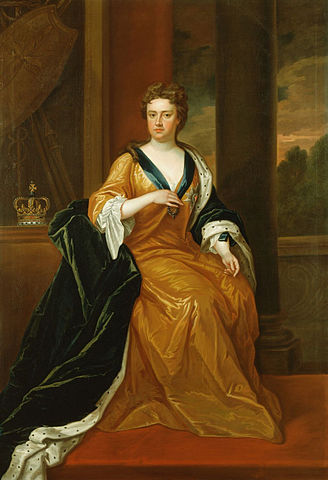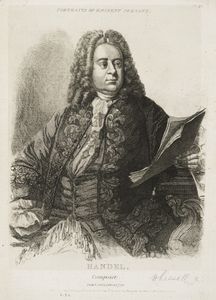By James Anderson Winn
In 1701, one year before Princess Anne succeeded to the throne, musicians from London traveled to Windsor to perform a special ode composed for her birthday by the gifted young composer Jeremiah Clarke. The anonymous poet addressed part of his poem to the performers, taking note of Anne’s keen interest in music:

Portrait of Anne of Great Britain by Charles Jervas, 1702-1714, Royal Collection, public domain via Wikimedia Commons.
With song your tribute to her bring,
Who best inspires you how to sing;
None better claims your lays than she
Whose very soul is Harmony.
O happy those whose art can feast
So just, and so refined a taste.
As the poet evidently knew, Anne’s just and refined taste was shaped by her own musical experiences. Her music teachers included Francesco Corbetta, the leading guitarist in Europe, and Giovanni Battista Draghi, the harpsichord player who composed the first setting of Dryden’s “Song for St. Cecilia’s Day, 1687.” Henry Purcell wrote the music for her wedding and for other occasions at her court; when he died, still in his early thirties, his widow dedicated a posthumous collection of his keyboard pieces to the Princess, thanking her for her “Generous Encouragement of my deceas’d Husband’s Performances in Musick, together with the great Honour your Highness has don that Science in your Choice of that Instrument, for which the following Compositions were made.”
I have paid particular attention to music written for the often misunderstood Queen, a musician and lover of the fine arts. The four examples I offer here are especially rich and complex.
We begin with an excerpt from Purcell’s last substantial work, an ode for the sixth birthday of William, Duke of Gloucester, Anne’s only child to survive infancy. The political situation at this moment was complex. After the armed coup of 1688, which deposed Anne’s father, James II, and replaced him with her sister Mary and her brother-in-law William, the two sisters had quarreled. Their estrangement continued until Mary’s death in 1694, and although William went through the motions of a reconciliation, his relationship with Anne was edgy at best. In praising the little Duke, the poet paid court to Anne in language that might easily be read as praising the Princess at the expense of the King:
She’s great, Let Fortune Smile or Frown,
Her Virtues make all Hearts her own:
She reigns without a Crown.
Evidently aware that the last line might be offensive to the King’s supporters, Purcell set it only once and surrounded it with two longer settings of the previous line—“Her Virtues make all Hearts her own”—a safer expression of Anne’s growing popularity. He devotes eleven measures to the line about Anne’s virtues, stretching it out with extensive melismatic treatments of the word all, disposes of the line about reigning without a crown in only six measures, and then returns to the words of the penultimate line for another eighteen measures. His setting thus alters the rhetoric of the poem, moving what had been a climactic and cadential line in the poem into a much less prominent position. Purcell had good reasons to look forward to the accession of Anne, who knew more about music than her predecessors, but he had far too much tact to crown her prematurely.
Henry Purcell, excerpts from Who can from Joy Refrain? Performers: Bradford Gleim, baritone; Teresa Wakim and Brenna Wells, sopranos; Jesse Irons and Megumi Stohs Lewis, violins; Peter Sykes, harpsichord; Sarah Freiberg, cello.
Our next example comes from the birthday ode of 1701. At this moment, Anne was just emerging from six months of mourning for her son Gloucester, who had died a few days after his eleventh birthday. In a touching and delicate aria sung by the tenor Richard Elford, who soon became Anne’s favorite singer, the words express the hope that she might bear another child.
In her brave offspring still she’ll live,
Nor must she bless our age alone;
But to succeeding ages give,
Heirs to her virtues, and the throne.
After an innocent string ritornello in B-flat major, the vocalist enters in d minor; Clarke’s wistful expression of the hope for more heirs to Anne’s virtues thus delicately acknowledges her sorrow for the lost Gloucester. The contrast with earlier birthday odes, in which composers saluted Gloucester with martial fanfares, is striking.
Jeremiah Clarke, excerpt from Let Nature Smith, birthday ode for Princess Anne (1701 ?). Performers: Owen McIntosh, tenor; Jesse Irons and Megumi Stohs Lewis, violins; Sarah Darling, viola; Peter Sykes, harpsichord; Sarah Freiberg, cello.
Our third example is an anthem composed by John Blow for the thanksgiving service at St. Paul’s cathedral in 1704, celebrating the Duke of Marlborough’s victory in the Battle of Blenheim. The Bible reading for the day tells the story of the prophetess Deborah, who sent her general Barak to defeat the Philistines. As a married non-combatant who ruled her nation, Deborah was a close biblical analogue for Anne, and one detail in the song’s description of the battle matched the events at Blenheim with eerie accuracy: “The river of Kishon,” sings the prophetess, “swept them away,” and at the end of the recent battle, at least 2,000 French cavalrymen had drowned in the Danube. In constructing his anthem, Blow carefully rearranged a few selected verses from the recommended chapter. After one soloist sings verse 21 of the biblical story, the description of the river, the other joins him in verse 13, celebrating Deborah’s “dominion over the mighty” in a canonic duet involving several hair-raising dissonances, after which the first singer, again alone and safely back in triadic harmonies, declaims verse 31, which prays that all the Lord’s enemies will perish.
John Blow, excerpt from Awake, awake, utter a song (1704). Performers: Owen McIntosh and Marcio de Oliveira, tenors; Peter Sykes, organ; Sarah Freiberg, cello.
We end, as we must, with Handel, whose music the Queen clearly appreciated: she awarded him a generous pension of £200 a year (roughly £40,000 in modern money). Handel’s “Serenata” for the queen’s birthday in 1713 celebrates the impending Treaty of Utrecht, ending a long war on favorable terms. The text, by the Whig poet Ambrose Philips, has seven stanzas, each ending with the same couplet:
The Day that gave great Anna Birth,
Who fix’d a lasting Peace on Earth.
In his first stanza, the poet asks the sun, the “Eternal Source of Light divine,” to “add a lustre to this day,” and for this aria, Handel featured Richard Elford, Anne’s favorite singer in her Chapel Royal, and wrote a trumpet obbligato for John Shore, a versatile and inventive musician who had served the queen and her late husband for years. At thanksgiving services during Anne’s reign, Shore and Elford often performed the prominent parts for high tenor and trumpet in Purcell’s Te Deum and Jubilate, so Handel was honoring the traditions of the Chapel Royal by using them as soloists, by writing in the same key (D major), and by composing a canon between the voice and the trumpet that imitates Purcell’s compositional practice. Like the other composers, he was evidently confident that the queen’s musical ear would allow her to hear and appreciate the compliment he was paying to English music.
George Frideric Handel, aria from Eternal Source of Light Divine (1713). Performance: Jason McStoots, tenor; Robinson Pyle, trumpet; Dorian Bandy and Emily Dahl, violins; Anna Griffis, viola; Peter Sykes, harpsichord; Denise Fan, cello.
Three hundred years ago, on 1 August 1714, Queen Anne died in the Kensington Palace in London. James Anderson Winn is William Fairfield Warren Professor of English at Boston University. His six earlier books include Unsuspected Eloquence (1981), a groundbreaking history of the relations between poetry and music; John Dryden and His World (1987), a prize-winning biography; and The Poetry of War (2008), praised by one reviewer as a book “for anyone who cares about war and truth.” His new book, Queen Anne: Patroness of Arts, includes 23 musical examples, each of which is printed in full score; a companion website allows the reader to listen to performances of each of the excerpts, many of them not heard since Queen Anne’s time.
Subscribe to the OUPblog via email or RSS.
Subscribe to only history articles on the OUPblog via email or RSS.
The post The Queen whose Soul was Harmony appeared first on OUPblog.




